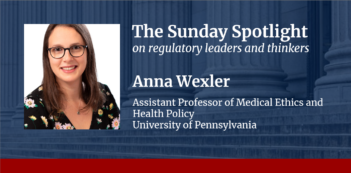
To improve the health care system, the values Americans have about health care must change.
In March 2019, the Patient Protection and Affordable Care Act (ACA) celebrated its ninth anniversary. When President Barack H. Obama signed the ACA into law, few people could have imagined that Democrats would now be debating whether “Medicare for all” should be a centerpiece of their 2020 policy goals.
This debate is evidence of the beginning kernels of a major conceptual shift in health policy and, in turn, health law and regulation.
One of the most defining features of the last half-century has been looking to markets to solve health care’s greatest woes—relatively high spending and disappointing nationwide outcomes compared to other developed countries. For instance, the United States spends more on health care per capita than any other Organization for Economic Co-operation and Development (OECD) countries, and yet it has lower life expectancy and higher infant mortality than many of them.
Market choice now pervades all corners of health care. You can choose your own insurance plan. You can choose your hospital, imaging center, pharmacy, urgent care facility, lab, and outpatient surgical center. You can choose your procedures and drugs. In turn, the promise is that good choices will drive higher-value health care.
Some of the ACA’s key policies rely on consumers navigating health care markets well. Take, as one example, the ACA health insurance exchanges. Their design was loosely based on Alain Enthoven’s idea of “managed competition”—that people will choose wisely among health plans in a managed marketplace and, over time, the plans will have to compete on value. This same idea underlies the design of Medicare Advantage—Medicare’s managed care option—and Medicare Part D supplemental drug coverage. As another example, the rise of high-deductible health plans—where patients must pay a larger share of medical costs out-of-pocket—was supposed to create incentives for patients to decline low-value care and to price compare among providers.
These types of consumerist theories have had tremendous influence over the last decades of health policy and are now deeply woven into the fabric of health policy and health regulation. Yet, over the past decade, it has become undeniably clear that these market-based policies that rely on consumerism are not delivering as promised—and will almost certainly never do so.
In a forthcoming article in the UCLA Law Review, I document a large and mounting body of empirical research that shows that key market-based policies in health care have failed. Even if well intended, these policies have often not helped people make meaningful choices of medical care or insurance plans. And neither have they controlled spending, as experts promised.
In fact, they are doing exactly the opposite. They are setting people up to make poor choices and are scaffolding a massive, ineffective market bureaucracy.
One-third of people said they would rather file their taxes than read the terms of a health plan. And reams of studies summarized in my article affirm that people do not choose well among health insurance plan options, and these errors are hard to remedy with anything short of a strong default plan—in which case, one must ask whether “choice” even matters.
Likewise, even when people have to pay a large share of their own medical care and have easy access to price information, they still do not compare prices or choose the lowest-price options, even for services with little variation in quality. One partial explanation is that health care patients look to doctors—not price lists—to steer their care. Patients lack the desire, time, knowledge, and skills to navigate medical decisions as “consumers.”
The focus of the last several decades of health regulation has been to try to fix broken markets and flawed consumers through constant regulatory, technocratic tinkering—either to spur competition or to nudge consumers toward better choices. This tinkering has fallen short, and it has produced a massive market-based bureaucracy.
Thick layers of government regulations and regulators attempt to scaffold failing market-based policies. Plus, this scaffolding has deeply embedded private health care enterprises—with high profits and salaries—into the bureaucracy. As one example, the 2018 salary for the CEO of Blue Cross and Blue Shield of Michigan was recently reported to be $19 million, which is not an unusual sum among health care executives.
Because markets do not meaningfully enhance choice, do not avoid bureaucracy, and have certainly not solved cost problems, it is time to stop tinkering and to seek a better foundation for the next era of health policy and regulation.
Democrats’ Medicare expansion proposals signal a willingness to start this conversation about what values, other than market competition and individual consumer choices, should guide future health policy. These proposals prioritize, for example, the intertwined goals of access and price control.
Americans have been increasingly showing support for universal health care access. For example, collective grassroots organizations across states and political parties resisted congressional Republican attempts to “repeal and replace” the ACA in the summer of 2017. Moreover, four red states recently passed Medicaid expansion ballot initiatives.
The various proposals for Medicare expansion are responsive to these public expressions of shared values. And such proposals are the beginning of a larger, much-needed conversation about what shared priorities should inform health policy.
It is time to give up the false hope that health care markets and individual purchase decisions will produce a health care system that Americans want and, in the process, drive down spending. Policymakers have spent a half-century avoiding the hard questions about what values, objectives, and tradeoffs should guide health policy, by hoping that markets would magically answer these questions.
The reality is that the only way to build effective health policy—and, in turn, health regulation—is by engaging deeply in these hard questions and the challenging political battles they necessarily provoke.
This essay is part of a 12-part series, entitled What Tomorrow Holds for U.S. Health Care.




